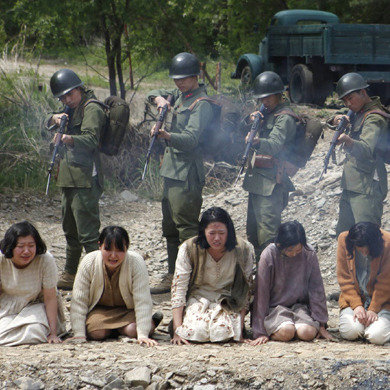Movies about the Japanese rule strike a chord with the public
Movies about the Japanese rule strike a chord with the public
Posted February. 29, 2016 07:06,
Updated February. 29, 2016 07:17

“Spirits’ Homecoming,” a movie about comfort women for Japanese soldiers under the colonial rule, hit the one million mark in only five days from the release. Critics say that it is a surprising result given that it is distributed by a minor distributor and the filming of the movie was once suspended due to the lack of investors. Even Cho Jung-rae, the director of the movie, says, “It’s a miracle every day.”
“DONGJU: The Portrait of a Poet,” a black and white movie about Yoon Dong-ju, a poet who lived under the Japanese colonial rule, also hit the 500,000 mark on Saturday in 27 days from its release. The low-budget movie, which cost 600 million won (485,200 U.S. dollars) for production, has been shown on more screens through word of mouth in the second week of the release than the first week, heralding a long term success.
Like the films, the background of the Japanese colonial rule is getting popular. The movie industry had a myth that the background of the Japanese colonial rule is a “recipe for failure.” However, after “Assassination” attracted more than 10 million moviegoers last year, a series of movies with the background of the colonial rule are in the pipeline. “Secret Agent (starring Song Kang-ho and Gong Yoo, directed by Kim Jee-woon),” a movie about a group of independent fighters, will be released in the second half of this year, and “Battleship Island (starring Hwang Jung-min and So Ji-seop, directed by Ryoo Seung-wan),” a story about some 400 Koreans who try to escape from the island after being forcefully conscripted, will be released next year.
An episode of “The Infinite Challenge,” an MBC entertainment show, had a viewership of over 16 percent (surveyed by Nielson Korea) in September last year when it broadcast about Hashima Island, an island where Koreans were forced to labor under the colonial rule. The reissued collection of poems written by Yoon Dong-ju has become a bestseller, and a musical and an album about the poet were made, reflecting an unusual boom about the poet.
These contents highlight the history of exploitation, which Koreans find uncomfortable, and the identity of victims. They are different from previous ones, which were about independent fighters or the hero of a difficult time, generating catharsis to people. Analysts say that the diplomatic relationship between Korea and Japan strained since the inauguration of the Shinzo Abe administration and the much debated issue over the removal of the statue of a comfort woman invoked the public’s interest in history and a sense of responsibility. Apart from their completeness or fun, "Spirits’ Homecoming" and "DONGJU" are perceived as must-watch movies for those who believe they have historical awareness,” Kang Yoo-jeong, a movie critic, said. “With the Korea-Japan relationship compounded by the issue of the statue of a comfort woman, the public shows increased attention to contents of the colonial rule.”
Some analysts say that an ordinary individual’s sacrifice due to a historical tragedy struck a chord with young people. In fact, teenage girls who were forced to become comfort women are the heroines of “Spirits’ Homecoming,” and Yoon Dong-ju, the poet in the movie “DONGJU,” was prosecuted by the Japanese colonial rule although he was a good and private poet, rather than an independence fighter.
“The story of young people who were sacrificed under the unjust colonial rule regardless of their will seems relevant to today’s audiences,” Kim Heon-sik, a cultural critic, said. “This also indicates that many young people believe that the world is unjust and things do not work in their way.”
구가인기자 comedy9@donga.com







